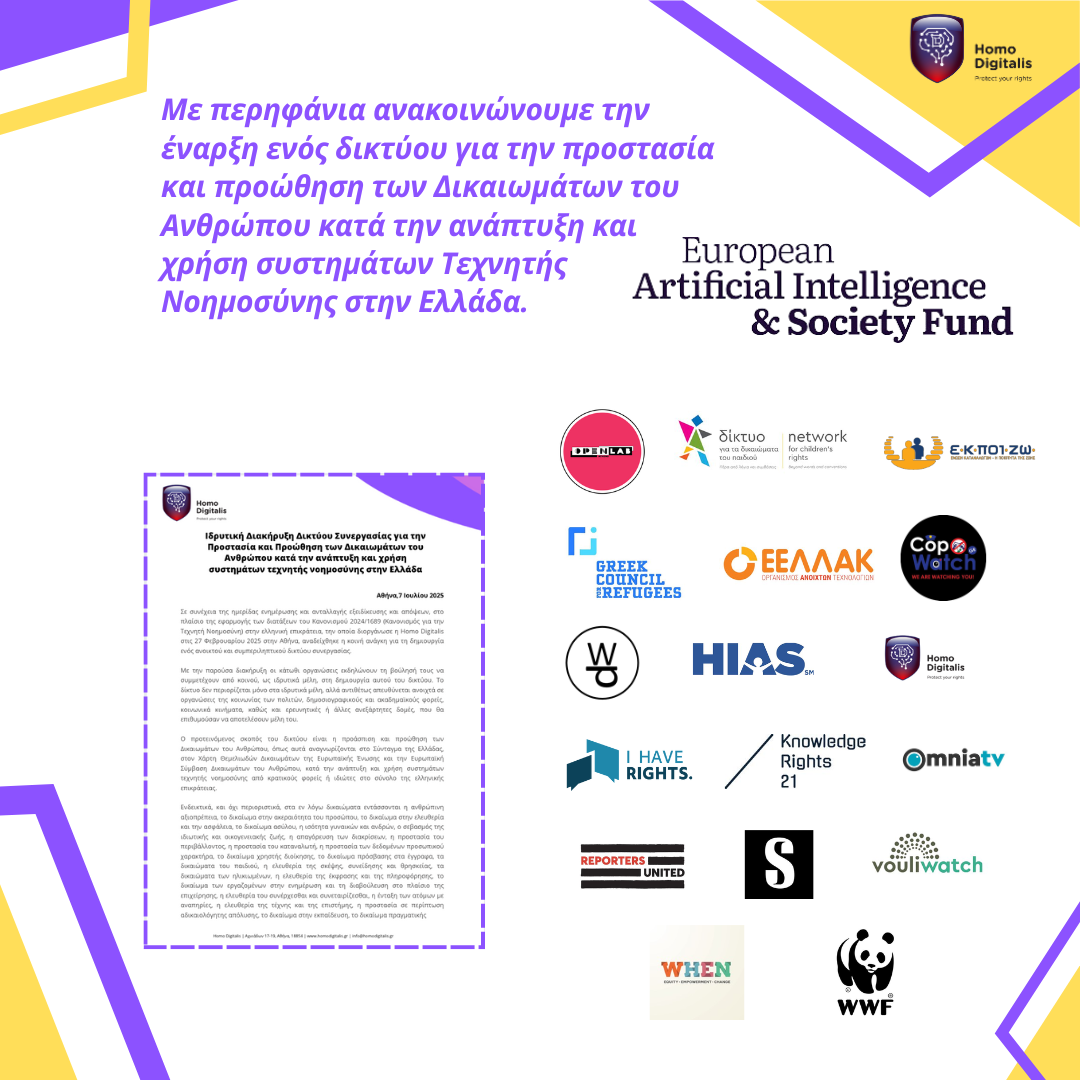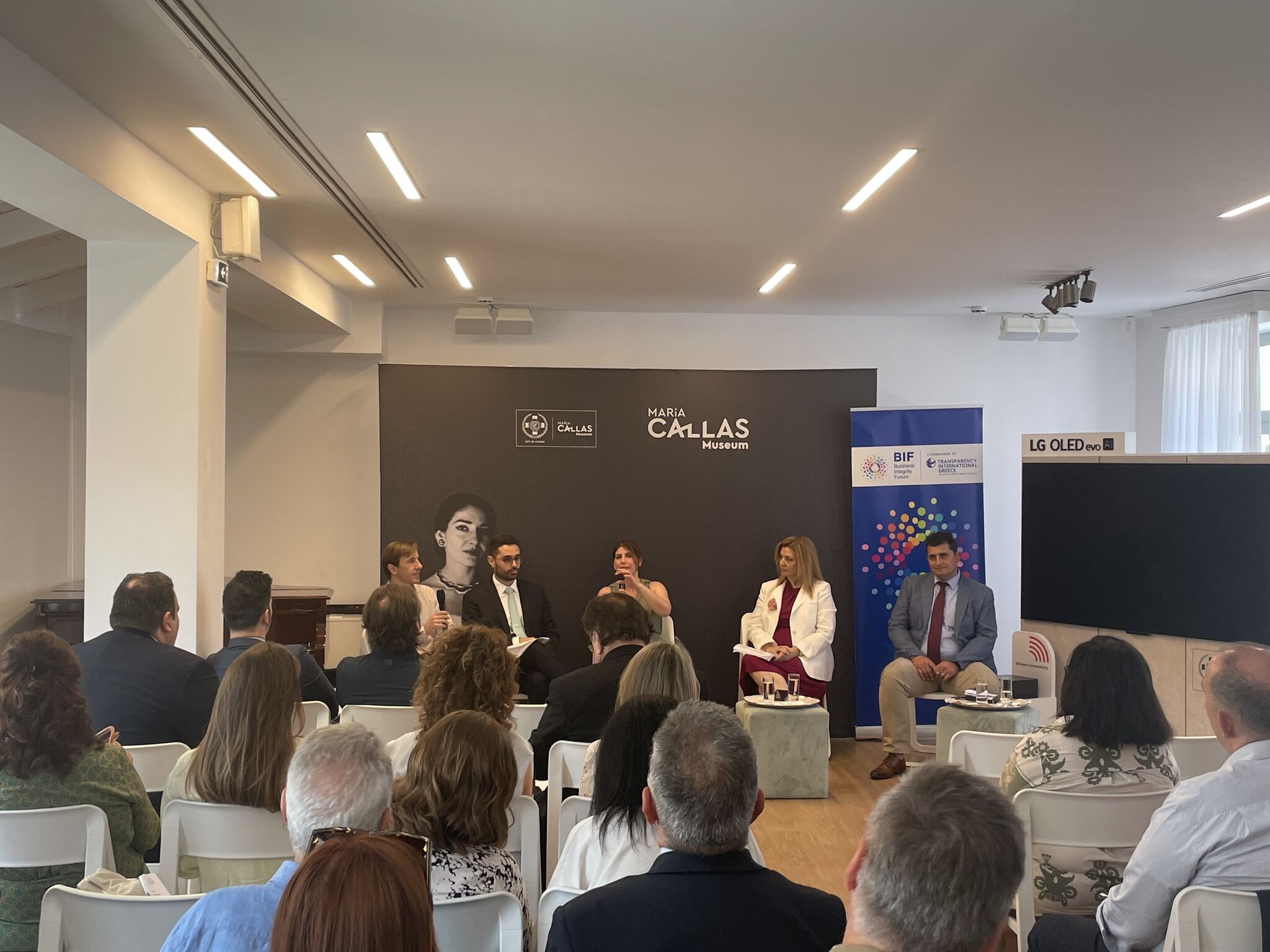Homo Digitalis spoke at the 2nd International Conference of ATI dedicated to Democracy and Social Justice.
Homo Digitalis participated in the 2nd International Conference of the Alexis Tsipras Institute
Konstantinos Kakavoulis joined academics, professionals, politicians, and activists from Greece, the European Union, and the United States. He spoke about the need to strengthen the protection of digital rights in modern democracies, on a panel that attracted great interest. Among the distinguished speakers at the event were Bernie Sanders, Michael Sandel, Jeffrey Kopstein, and many others. The speech is available at the link here.
We warmly thank the organizers for the invitation and for the excellent discussions we had during the event!
Joint Declaration for the Creation of a Human Rights Protection Network in the Development & Use of AI Systems – GAIN
We are proud to announce the official launch of a collaborative and inclusive network, committed to the protection and promotion of Human Rights, Democracy, and the Rule of Law in the development and use of Artificial Intelligence systems in Greece.
The network was born out of a multi-stakeholder dialogue initiated during the February 2025 event organized by Homo Digitalis, in light of the implementation of the European Artificial Intelligence Regulation (Regulation 2024/1689).
The text of the Declaration is available here.
The mission of the network is to serve as a space for collaboration, advocacy, legal interventions, and public awareness, ensuring that AI systems in Greece comply with fundamental rights and democratic values, as enshrined in the Greek Constitution, the EU Charter of Fundamental Rights, and the European Convention on Human Rights.
The working title of the network is Greek Artificial Intelligence Network – GAIN. The founding conference, which will take place within three (3) months, will determine the network’s governance framework, guiding principles, and future direction.
The initiative is coordinated by Homo Digitalis, with the support of the European Artificial Intelligence & Society Fund (EAISF), and is open to any interested organization.
If you are interested, you can fill in the participation form here.
Founding organizations of the network (in alphabetical order):
Ανοιχτό Εργαστήριο Αθήνα | Open Lab Athens
Δίκτυο για τα Δικαιώματα του Παιδιού | Network for Children’s Rights
Ε.Κ.ΠΟΙ.ΖΩ.Ένωση Καταναλωτών «Η Ποιότητα της Ζωής» | Consumers’ Association “The Quality of Life” EKPIZO
ΕΛΛΗΝΙΚΟ ΣΥΜΒΟΥΛΙΟ ΓΙΑ ΤΟΥΣ ΠΡΟΣΦΥΓΕΣ | GREEK COUNCIL FOR REFUGEES
Οργανισμός Ανοιχτών Τεχνολογιών – ΕΕΛΛΑΚ | Open Technologies Alliance (GFOSS)
ΠΑΡΑΤΗΡΗΤΗΡΙΟ ΑΣΤΥΝΟΜΕΥΣΗΣ copwatch.gr
DATAWO
HIAS Greece
Homo Digitalis
I Have Rights
KnowledgeRights21 (National coordinator for Greece and Cyprus)
OmniaTV (iCase Κοιν.Σ.Επ.)
Reporters United
Solomon
Vouliwatch
WHEN Equity Empowerment Change
WWF Greece
Homo Digitalis successfully completed its presentation at a conference of the Ministry of Justice & the Administrative Court of First Instance of Athens on Artificial Intelligence
On Monday, June 16, 2025, the Ministry of Justice hosted a conference on “Artificial Intelligence in Justice”!
In the third discussion panel titled “Limitations and Risks”, Homo Digitalis was represented by Stefanos Vitoratos, Co-founder of Homo Digitalis and Partner at Digital Law Experts (DLE).
The discussion was moderated by Sophia Papadimitriou, with speakers:
Lilian Mitrou, Professor at the University of the Aegean, President of the Institute for Privacy Law, Personal Data and Technology
Ioannis Angelou, Administrative Court Judge, PhD
Aris Dimitriadis, Member of the Ethics Committee of the AI Catalyst Group, Executive Director of Regulatory Compliance and Corporate Risk Management at OTE Group
The conference was organized by the Administrative Court of First Instance of Athens, with the support of the AI Catalyst Group!
Homo Digitalis meets with the Greek Ombudsman
he Greek Ombudsman welcomed the non-profit organization Homo Digitalis to his offices on June 26, 2025, for a meeting on issues related to digital rights and artificial intelligence. Among other topics, the discussion addressed the role of the Ombudsman under the European Union’s Artificial Intelligence Act, following his designation as one of the fundamental rights authorities under Article 77 of the Regulation.
We warmly thank the Honorable Greek Ombudsman, Mr. Andreas Pottakis, for his time and availability.
Participating in the meeting was Homo Digitalis Co-founder and Executive Director Eleftherios Chelioudakis.
Homo Digitalis at the 2nd International Conference of ΑΤΙ dedicated to Democracy and Social Justice
Homo Digitalis will participate in the 2nd International Conference on Democracy and Social Justice, taking place on June 10 at 15:00 at the Nikos Skalkotas Hall of the Athens Concert Hall, organized by the Alexis Tsipras Institute!
Our organization will be represented by Konstantinos Kakavoulis, Co-Founder of Homo Digitalis & Lawyer, who will deliver a speech in Thematic Session II: “Democracy and Digital Transformation.”
Also speaking in the same session:
Evagelia Emily T., Assistant Professor and Researcher at the McCourt School of Public Policy, Georgetown University
Elisavet Linos, Associate Professor of Public Policy and Management, Harvard Kennedy School of Government
Kostas Gavroglou, former Minister of Education, Research and Religious Affairs (2016–2019)
Christos Porios, Founder of Schema Labs & Open Council
You can find more information about the conference, registration, and the full program – which features internationally renowned and highly respected speakers – here.
Homo Digitalis successfully delivered its talk at CPDP2025
Two weeks ago Homo Digitalis participated again at Computers, Privacy and Data Protection Conference, speaking at the Panel “Protecting the Digital Rights of Asylum Seekers and Refugees”, organised by the Centre for Fundamental Rights – Hertie School!
Eleftherios Chelioudakis, from our team joined Francesca Palmiotto (IE University) , Derya Ozkul (University of Warwick) and Joanna Parkin (EDPS – European Data Protection Supervisor) on Friday 23.05, at the closing panel of the conference in Grande Halle!
You can read the full recap of our panel discussion here.
Congratulations to the team of organizers from Hertie School, Ida Reihani, for their great efforts and cooperation!
Homo Digitalis successfully participated in the Business Integrity Forum of Transparency International
Today, Homo Digitalis took part in the 17th Round Table titled “Greek Business and Transparency: Building Trust and Competitiveness”, organized within the framework of the Business Integrity Forum, a commitment of Transparency International Greece!
Specifically, Lamprini Gyftokosta from our team moderated the panel “AI and Ethics in Business Compliance”, with contributions from Alexandros Nousias (Institute of Informatics & Telecommunications at NCSR Demokritos), Panagiotis Sourlas (Growthfund, the National Fund of Greece), Irene Papadopoulou (ΣΟΛ Crowe), and Sofoklis Karapidakis (Metlen Energy & Metals).
We warmly thank the organizers and the Executive Director of Transparency International Greece, Angelos Kaskanis, for the kind invitation!
Homo Digitalis successfully participated in the Digital World Summit Greece 2025
Last week, the Co-Founder of Homo Digitalis, Stefanos Vitoratos, spoke at the Digital World Summit Greece about the next steps in the evolution of Artificial Intelligence, what we can expect over the next decade, and best practices that can help create a safer environment.
“Artificial Intelligence is not going to wipe out human labor; as in every phase of technological transition, what changes is not the need for work, but the environment and the way it is carried out. What is required is adaptation and active participation in the new reality,” he emphasized.
You can watch highlights from the speech in the video here.
We warmly thank the organizers for this opportunity to collaborate, as well as the fellow speakers and the panel moderator for the fruitful discussion!








